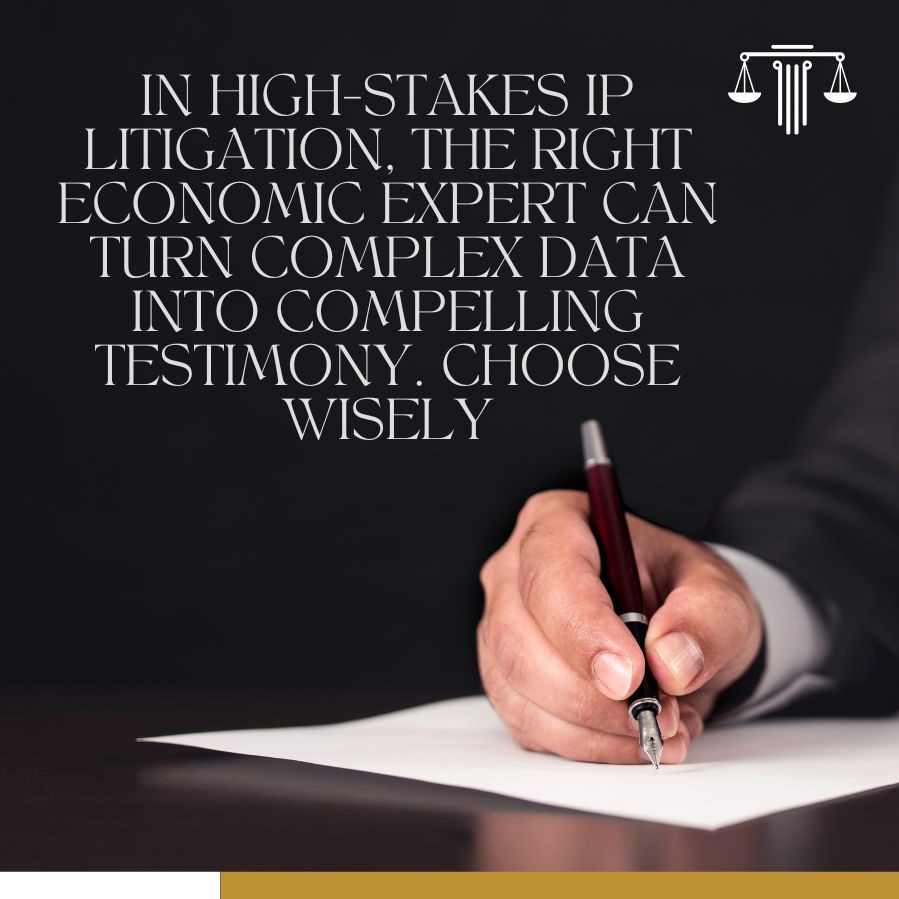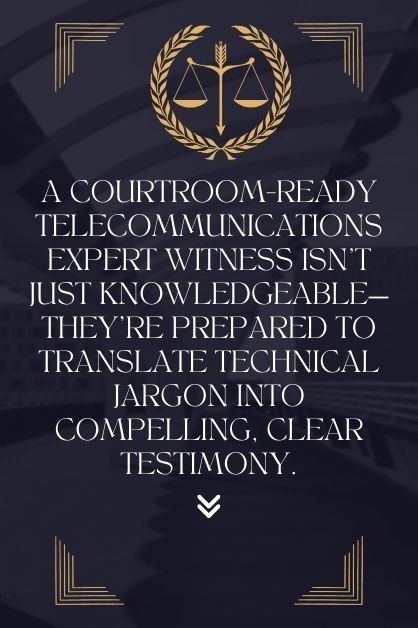How to Ensure Your Telecommunications Expert Witness is Courtroom Ready
Telecommunications disputes often involve complex technologies and intricate legal questions that can be difficult for a judge or jury to grasp. When facing such cases, the right expert witness can be the key to translating these technical details into clear, persuasive testimony. However, technical expertise alone isn’t enough—your telecommunications expert must also be courtroom-ready, prepared to handle cross-examination, explain their findings in layman’s terms, and meet the stringent legal standards for admissibility. Without these skills, even the most knowledgeable expert risks undermining your case.
A courtroom-ready telecommunications expert witness must be able to clearly communicate complex technical details, defend their methodology under cross-examination, and ensure their testimony is both relevant and admissible. Without these abilities, even a qualified expert can hurt the case, as was seen in the landmark case of Sprint Communications Co. L.P. v. Comcast Cable Communications, LLC.

This case offers key lessons on what to do—and what not to do—when preparing telecommunications experts for court.
Ensuring that your telecommunications expert witness is courtroom-ready is critical for successful litigation. This article explores how to address communication issues, ensure relevance and admissibility, and prevent expert insufficiency, using lessons from the Sprint Communications v. Comcast Cable Communications case.
Lessons from Sprint Communications Co. L.P. v. Comcast Cable Communications, LLC
In the Sprint Communications v. Comcast Cable Communications case, Sprint sued Comcast for patent infringement, alleging that Comcast had used patented telecommunications technology without permission. The case centered around complex network routing technology, and Sprint relied on expert testimony to explain the technical aspects of its patents and how they had been infringed upon.
Sprint hired an expert witness to provide testimony about the technical details of their patented technology and calculate damages for the alleged infringement.
However, several missteps in the expert’s preparation and courtroom performance led to the undermining of Sprint’s case.
Key Issues with the Expert Witness Testimony For a Telecommunications Expert Witness:
Inadequate Explanation of Technical Concepts: While the expert had the technical expertise, he struggled to effectively communicate the intricate telecommunications technology to the jury. His use of highly technical language without clear explanations confused the jurors, making it difficult for them to follow his testimony.
Flawed Methodology: The expert witness’s damages calculations were based on assumptions that Comcast successfully challenged during cross-examination. His methodology for calculating the reasonable royalties owed by Comcast for using Sprint’s technology was criticized for not being grounded in a reliable framework. As a result, the court questioned the credibility of his analysis.
Failure to Withstand Cross-Examination: During cross-examination, the selected expert witness struggled to defend his methodology, and opposing counsel successfully exposed weaknesses in his analysis.

This not only discredited the expert but also weakened Sprint’s overall damages claim.
Outcome:
The flaws in the expert’s testimony had a major impact on the outcome of the case. Comcast was able to exploit the inconsistencies in his damages calculation and methodology, leading to a much lower damages award than Sprint had anticipated. This case highlights how even the most qualified expert can fail if they are not fully prepared to be courtroom-ready.
Source: Sprint Communications Co. L.P. v. Comcast Cable Communications, LLC, No. 11-cv-2684 (D. Kan. 2017).
How to Avoid These Mistakes: Ensuring Your Telecommunications Expert is Courtroom Ready
The Sprint Communications v. Comcast Cable Communications case offers a clear lesson in the importance of preparing your expert witness for court. Below are the critical steps to ensure that your telecommunications expert is ready for the courtroom and can deliver credible, persuasive testimony.
1.Focus on Communication: Simplifying Complex Concepts
In the Sprint case, the expert’s inability to clearly explain technical telecommunications concepts to the jury significantly weakened his testimony. When an expert fails to break down complex technical details into simple, understandable language, their testimony becomes inaccessible to the decision-makers.
What to Do:
Simplify complex ideas: Work with your expert to translate technical jargon into layman’s terms. Analogies and metaphors can be useful for explaining complex processes such as network routing, spectrum allocation, or wireless communications protocols.
Practice mock presentations: Have the expert practice presenting their testimony to non-expert audiences, such as paralegals or friends unfamiliar with the topic. This will help them identify areas where their explanations may need to be simplified.
Use visuals: Diagrams, charts, and models can help the expert illustrate complex systems and make abstract concepts more tangible for juries.
Why it Matters:
A courtroom-ready expert can distill technical concepts in a way that resonates with the court.
By failing to do so, the expert lost the attention of the jury, which contributed to Sprint’s underwhelming result.
2. Ensure Relevance and Admissibility: Methodology Matters
In the Sprint case, the expert’s flawed methodology for calculating damages was a major point of contention. His failure to apply a reliable framework for determining royalties led to a weakened damages claim. In telecommunications litigation, the methodology must be both relevant to the case and admissible under the law.
What to Do:
Ground the expert’s analysis in accepted methodologies: Ensure that the expert’s damages calculations or technical analyses are based on reliable, industry-standard methodologies that have been accepted in previous cases.
Test their methods before trial: Have the expert prepare an initial report and subject it to review by other experts or legal professionals. This will help identify any potential weaknesses in their approach before they face cross-examination.
Align testimony with legal standards: In U.S.
courts, expert testimony must meet the Daubert standard, which requires that the methodology used by the expert is scientifically valid and applicable to the case. Ensure that your expert understands this requirement and structures their analysis accordingly.
Why it Matters:
A solid, reliable methodology is essential for relevance and admissibility in court. the expert’s failure to present a methodologically sound damages calculation gave Comcast’s legal team the opening they needed to undermine his credibility.
3. Vetting Your Telecommunications Expert: Avoid Bias and Conflicts of Interest
In high-stakes litigation, the credibility of your expert can be easily called into question if there is any hint of bias or conflicts of interest. In the Sprint case, while the expert’s background was not directly attacked for bias, the flaws in his methodology raised concerns about the reliability of his analysis. Thoroughly vetting your expert before the trial is critical to avoid such pitfalls.
What to Do:
Screen for bias and conflicts of interest: Investigate whether the expert has any professional or personal ties to the opposing party or has consistently testified for one side (e.g., always for plaintiffs or defendants). This ensures that the expert appears impartial.
Review prior testimony: Look into the expert’s previous court appearances and examine how their testimony has held up under cross-examination. Experts with a history of having their testimony excluded or criticized are risky choices for high-stakes litigation.
Use a vetted expert witness network: Engaging experts through a vetted expert witness network can help ensure that your expert has been pre-screened for qualifications, litigation experience, and potential conflicts of interest.
Why it Matters:
By thoroughly vetting your telecommunications expert, you can ensure their impartiality and credibility, minimizing the risk that opposing counsel will exploit potential biases during cross-examination.
4. Prepare for Opposition Strategies: Defending Against Cross-Examination
In the Sprint case, Comcast’s legal team effectively attacked the expert’s methodology during cross-examination, causing him to struggle to defend his conclusions.
Preparing your expert to handle opposition strategies is essential for ensuring their testimony stands up under pressure.
What to Do:
Conduct mock cross-examinations: Practice cross-examinations with the expert, focusing on areas where their analysis may be vulnerable. This will help them stay calm and collected under pressure and strengthen their ability to defend their methodology.
Focus on clarity and consistency: Ensure that the expert’s report and testimony are consistent and free from any ambiguities or contradictions that opposing counsel could exploit.
Anticipate challenges: Work with the expert to identify the areas where their testimony may be challenged. Prepare them to defend their conclusions with confidence and clarity.
Why it Matters:
Opposing counsel will often try to undermine an expert by attacking their credibility, methodology, or impartiality. Preparing your expert for these strategies, as Sprint should have done with the expert, can prevent such attacks from damaging their testimony.
Conclusion: Preparing Your Telecommunications Expert for Courtroom Success
The Sprint Communications v. Comcast Cable Communications case underscores the importance of selecting and preparing a courtroom-ready telecommunications expert. By focusing on clear communication, ensuring the relevance and admissibility of their testimony, and thoroughly vetting and preparing the expert, law firms can significantly improve their chances of success in complex telecommunications litigation.
For law firms seeking to streamline this process, working with vetted expert witness networks, such as ExpertConnect Litigation Support, can help ensure you choose an expert who is not only technically proficient but also capable of delivering credible, effective testimony in court with a telecommunications expert witness.
Source: Sprint Communications Co. L.P. v. Comcast Cable Communications, LLC, No. 11-cv-2684 (D. Kan. 2017).